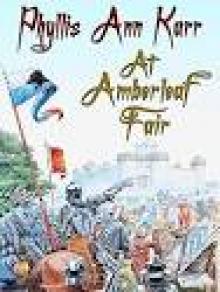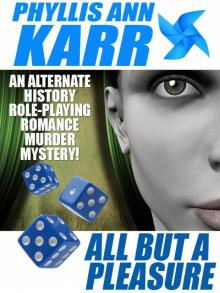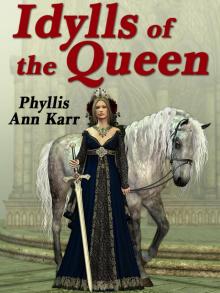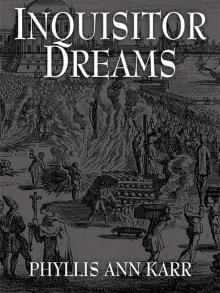- Home
- Phyllis Ann Karr
The Idylls of the Queen Page 13
The Idylls of the Queen Read online
Page 13
“Maybe he doesn’t want to attack his fellows of the Table,” I said, and added, before it came out more plainly which of Gawain’s brothers had killed Dinadan, or before our host and hostess realized it to their embarrassment, “What about Bors de Ganis, agreeing to fight for the Queen after all her dinner guests had been, in effect, disqualified?”
“Can he not fight for her in the name of his kinsman Lancelot, rather than in his own?” said the duchess.
“He can, but it’s a very thin covering,” I replied.
The duke shrugged. “Only a guiltless man would be so willing to accept the appearance of guilt.”
“In other words, then,” I said, “Bors is letting us know he’s upright enough and blameless enough to stand an appearance of guilt which would destroy any of us lesser mortals.”
“Calm yourself, calm yourself, Seneschal,” murmured Mordred. “We know you would have offered yourself as her champion if you had thought of these things before Bors. And what do you think of Pinel of Carbonek or Astamore of Gorre, your Grace?” he added to De la Rowse, in a louder voice.
“Pinel and Astamore? Don’t believe I know ‘em.”
“Pinel,” I told the Duke, “is a loudvoice nephew of King Pellam of Listeneise. Hence, either a nephew or a bastard son of Pellinore of the Isles. Pellam raised him at Castle Carbonek, and he tagged along with Lancelot back to us after the adventures of the Sangreal, to Pellam’s gain and Arthur’s loss.”
“Pellam the Fisher King?” De la Rowse dismissed Pinel with a wave of his ale cup. “They don’t teach ‘em vengefulness and poison at the Castle of the Grail, lad. Who is this Astamore, now?”
“The Grail is no longer at Carbonek, by Lancelot’s report and Pinel’s,” said Mordred. “Bors de Ganis adds that it was translated into Heaven along with the soul of Galahad the Pure, to escape the sin and horror of the latter days to come. Astamore is the nephew of Bagdemagus of Gorre.”
The Duke and Duchess looked blank. “Gawain killed Sir Bagdemagus by mischance, during a joust for love on the Grail Quest,” I explained.
De la Rowse sighed and tsked.
“The land of Gorre lost a noble king,” said the duchess. “Who rules it now?”
“Officially, Uriens took it back,” I said. “He wanted to give it to his legitimate son Ywain of the Lion, but Ywain is too happy dividing his time between his own castle with Dame Laudine and the King’s court with cousin Gawain. So Bagdemagus’ daughter Dame Clarisin is acting as lady vice-regent.”
“Leaving Astamore in the cold, eh? Did Astamore have any claim to the vice-regency?
I shrugged. “No more than Dame Clarisin, but Astamore doesn’t seem particularly ambitious.”
“Can’t always tell. Sometimes it lies hid, they say. Well, your young Astamore may have complaints against King Uriens and his kinswoman, but I don’t see he has any against Gawain. Chances of combat.”
“Yet ambition may twist a man’s thoughts into strange patterns,” said the duchess, probably speaking from books of romance and philosophy. Then she glanced at me and blushed. Sometimes news is so scarce in these self-sufficient little castles that old stories stay fresh for a couple of generations. Especially in the minds of the older folk. (I remember how it was in my own father’s castle, before we knew we were raising a High King.) The Duchess had obviously just remembered the affair of the Sword in the Stone, and feared her philosophical platitude about ambition twisting men’s thoughts would be taken personally by present company.
Yes, when Artus came to me bringing the Sword, putting it into my hands, I probably did develop a sudden overpowering itch to sit on the throne of Britain. But, Sweet Ihesu! An untried boy, not yet fifteen years old, who brings his elder brother Merlin’s famous Proof of Kingship as if he is completely unaware that the whole gathering and furor all around him—the only reason for us being in London at all—is to see who can pull this same Sword out of its blasted anvil and rock, who seems to think of it as no more than another weapon to use in the tourneying… What man would not have thought he could make a better High King than this slowheaded squire? And when I remarked on the Sword’s importance, when he finally understood what he had done and as good as begged me, like a half-frightened child, to let him slip it back and not tell anyone… Well, maybe I should have let him do that, instead of trying to pretend I had been the one to draw the Sword; but that would have left us in the same turmoil we had already been in for years. Trying to take the credit myself for drawing the Sword had seemed the sensible thing to do. I was a young fool, too, at the time, not much older than Artus.
“Don’t worry, Dame,” I said. “You’ll have to work harder than that if you want to throw the Sword in the Stone back in my teeth.”
“Sir Kay was wise enough,” said Mordred, “to see the hollowness of the crown and settle for the office of seneschal instead.”
“Where I have most of the work and none of the glory.”
“Exactly. The King’s invisible but invaluable errand boy.” Mordred put down his knife and held up his right hand to show he spoke in friendly jest. His smirk half belied the gesture. “But we stray from our serious discussion,” he went on. “What would you think of, say, Gaheris of Orkney as a poisoner?”
“Nay, nay!” said the duke. “When you start accusing your own brothers, then it’s plain the serious talk is done with.”
“True.” Mordred rose and sheathed his knife. “And the sooner we’re abed, the earlier we can ride in the dawning. Here, Seneschal, I find I’ve carved this ring too large for my finger. It may fit yours.” He tossed his latest serpent ring into my lap.
* * * *
That night I dreamed someone had found Lancelot hanging from a yew tree, his body cut off at the waist and moss growing in his beard. I was fighting as the Queen’s champion against Bors de Ganis. He ran me through in the second or third charge. Artus was screaming at me for a traitor and throwing things at me… those strange things you glimpse in dreams and know to be foul, but cannot quite recognize. Then I was at the stake, standing in the middle of the faggots, tied face to face with Guenevere. Her face was horrible, expressionless, as if she had lost her mind and feeling… like the face of her false look-alike when Heaven struck her with paralysis and she took months to decay alive in her bed. Except that this was the true Guenevere. Her face was stiff, but her arms were passionate, pulling me closer to her, into her. I realized Bors’ splintered lance was still in my side, piercing the Queen. I tried to pull away, but she held me fast, skewering herself, murmuring that the sword was swifter than the flame. Her lips did not move as she spoke. Holding her tightly to me, I looked around and saw it was not Arthur throwing things at us, but Mordred. I turned back to kiss Guenevere, and her face was already burned away to the skull, only her eyes staring back at me, perfectly round, the gray irises surrounded top and bottom by rings of white beginning to melt down on the blackened cheekbones.
I awoke screaming. I had not awakened screaming at a nightmare for years. Mordred was in the next chamber and heard it.
“And will you not do something to prevent its coming true?” he asked next day. “As your foster-brother the King did something about his serpent nightmare the year of my birth?”
“I am doing something to prevent it. We’ve been working to prevent it for the last four days. And I don’t have any Merlin at my elbow to interpret every bad dream as a direct prophecy.”
“And yet you saw me instead of the King, standing beyond the fire to pelt you with unpleasant things. Well, you might ask Dame Nimue of the Lake to interpret it for you.”
“The reason you got into it,” I said, “is because I’ve had to look at your smirking face all day, every day for the last four days and because of that damn serpent ring you tossed me last night.”
He smiled. “Yes, I do suffer from a fascination with serpents, do I not? Well, I suppose it must have been a shower of my little serpents with which I was pelting you in your dream.”
CHAPTER
16
The Battle at the Lake
“That is the Lady of the Lake, said Merlin; and within that lake is a rock, and therein is as fair a place as any on earth, and richly beseen…”
—Malory I, 25
We pushed ourselves, or maybe I was the one who insisted on keeping up a hard pace, and got to the Lake about sunset that same day.
“It looks like any ordinary lake,” said Lovel, standing up in his stirrups as if that would give him an appreciably longer view of its surface.
“Of course it does,” I said. “You can drink the water and quench your thirst, row a boat on it and catch fish—or swords, if you’re lucky enough—and if you wade in over your head, you’ll probably drown. But somewhere beneath that water is a city richer than Caerleon, and if Dame Nimue should deign to guide us there, we’ll breathe as easily as up here.”
“Will we see the blue sky and the clouds, too?” asked Gillimer. “Or will we see little fishes instead of birds swimming over our heads?”
I answered, “Ask Lancelot, if they ever bring him back to court. He was raised in a Lake identical to this one, over in France.”
“One of the oldest pieces of magic on earth,” said Mordred, gazing out over the reddened water, with the sun, half buried in clouds, touching the hills on the far side. “The City in the Lake, ruled always by a lady—sometimes a wicked dame, sometimes a kindly one, always a powerful one. I think the first Lady of the Lake must have been Adam’s paramour Lilith. A glamoury older than Merlin. Perhaps the great mage himself was taught by one of Dame Nimue’s predecessors, as he in turn taught Nimue and Aunt Morgan. They say that much of the old magic can only be taught to a man by a woman, and to a woman by a man.”
“You’re waxing poetic this evening,” I said.
“Why should I not? I hardly expected ever to see this night.”
“What does that mean?” I said. “You knew we were coming here to the Lake.”
He turned in his saddle and looked at me. “I admit to some curiosity as to whether you really did mean to come here eventually; but it was a curiosity I curbed, not expecting to be alive when and if you reached our supposed destination.”
“What in Ihesu’s Holy Name are you talking about?”
Mordred waded his palfrey fetlock-deep into the water. “What is your plan, now you’ve brought me this far?” he called back over his shoulder. “To drown me in the illusory Lake before calling up Dame Nimue? Or perhaps you mean to deal somehow with her to do away with me as she did away with Merlin?”
“Damn you, Mordred, have you gone completely out of your mind?”
He turned his horse, its hooves splashing in the water, and sat facing me. “Come, Seneschal. The game has almost reached checkmate. Why did you choose to ride with me, if not to finish the work the poisoned apples failed to do?”
“We chose to ride with each other… God, Mordred, you’ve had me on your list of suspects all along!”
“Not quite. I’ve been all but assured it was you from the beginning. The others were merely possibilities I saw when I tried to examine the situation as an unconcerned scholar. I could not allow my thoughts to stagnate in an obsession with my own encroaching death.”
I tried to keep my temper, remembering that, after all, I had secretly had Mordred high on my own list of possible traitors all along. “Your brains are even more rattled than we thought. What gave you the idea you were important enough to attract an assassin?”
“Was Sir Patrise important enough to attract an assassin?”
Gillimer said, “But the apples were meant for Sir Gawain.”
“So you were all meant to believe,” said Mordred. “Folk remember Gawain’s tastes. The rest of us love fruit, too, but whereas bowls of apples and pears are always brought out especially for Gawain, his less important brothers must wait their chances. No one would put out a bowl of fruit for Agravain or Mordred, if Gawain were not at the same meal. It happens that I have an especial fondness for pears, which were also in that bowl and also, presumably, poisoned—though the Queen and her adoring seneschal destroyed them before I could make the test. My death, like Patrise’s, would have been charged to an attempt on brother Gawain’s life. Clever of you, Sir Seneschal.”
Even after he finished his speech, I waited a moment to make sure I could keep my voice steady. Lovel sat pushing his palms along his saddle until the pommel squeaked beneath them. Gillimer had apparently decided he would be safer witnessing the discussion quietly than thrusting more of his own opinions into it.
“Clever and pointless,” I said at last. “If someone wanted to kill you, Mordred, what reason would he have for wanting it to look like an attempt on Gawain? God, don’t you have enemies of your own to kill you in open tourney or ambush?”
He seemed to wince, but talked on. “Granted, the need to make it seem an attempt on my brother was not essential. But why should you not use a method so convenient? Why not take all the precautions available against the right questions ever being asked, the truth found out?”
“What truth? If you’re talking about your lunatic fancies as ‘truth,’ they’re a pile of dead flies!”
“Then, too, Gawain would avenge a brother’s death, even brother Mordred’s, if he could learn the murderer. Convince Gawain that he himself was the target, and he would be less likely to seek vengeance or even knowledge of who had made the attempt. Certainly he would never believe it of his old comrade Kay, let alone of the Queen. Oh, yes, you were clever. Unfortunate that your plan failed and that the bullhead Mador de la Porte further complicated matters for you.”
“And suppose I’d killed Gawain, too? Suppose I’d killed half the men present? God! The Queen herself might have eaten—”
“Hardly,” said Mordred. “Whom are you trying to convince with your bluster, Seneschal? Lovel and Gillimer?”
“You really think I’d risk poisoning the Queen, Gawain, and a score of Arthur’s best knights, only to rid the court of you?”
“You risked no more than one or two lives at most,” said Mordred. “Patrise proved that. The advantage of quick poison over slow water and a leaky ship. But you should feel heavy for Patrise’s death. You might have prevented it, since he was beside you at table. I suppose you were concentrating your attention on me, at your other hand. As for Gawain, he was in very little danger. The Queen was at his elbow with more competent devices than yours to keep the wrong man from tasting—”
“You’re accusing Her Grace!”
Mordred only shrugged. “You had to learn it from someone, the reason I must be destroyed. And you would willingly go to Hell for Dame Guenevere, would you not?”
“Come out of the water and arm yourself,” I said. By Heaven, maybe he thought me an incompetent poisoner, but he was going to learn a few things about slandering the Queen in my presence!
Lovel was white and shaky. This was a family matter to him, with Gawain his father. I doubt he was much help to his uncle Mordred that evening. For once, even Gillimer had the sense to keep his silence while arming me and holding Feuillemorte’s stirrup.
If we had been traveling that day fully armed and on our warhorses, I would have gone berserk and charged Mordred in the water. It was as well we were forced to take a few moments to prepare. He had advance warning to be on his guard, but I had a chance to use my battle rage rather than let it use me, and to study the lay of the land.
Most areas would have been almost too dark for a good fight by now, but the Lake was surrounded by a narrow beach of white sand, even marked by ripple lines. No detail omitted. We charged on the strip of beach.
Mordred’s horse stumbled in the sloppy sand at the water’s edge, but he got in a lucky hit before he went down. I landed on dry sand, Mordred half in the water. He shook himself like a dog when he stood up, drops flying from his armor. “How does it go?” he called out, drawing his sword. “The son of a mare has failed me, but the son of my mother will not!”
All the same, he stood there waiting, the
water hissing against his greaves, and I had to wade in after him.
Mordred might have been feeling suicidal, but he did not let it slacken his arm. We fought everywhere between chest-deep water and back onto the grass beyond the beach. Gillimer and Lovel had work once or twice to keep the horses out of our way, and I wondered afterwards if Dame Nimue had already been watching us and guarding us from getting into her Lake over our heads or stumbling off a ledge into the illusory depths. We each left several chips of metal and a fair amount of blood in the water. My entire right vambrace was gone, and I came close to losing the arm with it, before I got Mordred down in knee-deep water and rashed off his helmet.
“Now,” I said, “repeat your slander of the Queen.”
“Was that not a better way than poison, Seneschal? More satisfying, and less likely to endanger your own salvation. You must take care to shrive yourself of Patrise’s death, of course, accidental or not.”
I grabbed a fistful of his golden hair in my left hand. The shadow of my shield blocked out what little twilight had still been hitting his face from the western sky, but I could feel where to slice for his neck.
“One last question,” he said. “Satisfy my curiosity. Was it you and the Queen alone, or did you act on the King’s command?”
“What in God’s Name are you talking about?”
“Ah. So the accusation does not enrage you so much when made against your foster brother the King as when made against your foster brother’s wife. Whereby I assume that Arthur was behind you in your attempt.”
I tightened my grip and shook the man, my gauntlet rattling against his forehead and scalp. I got nothing but a groan out of him. “By God and sweet Ihesu,” I said, “you’re going to tell me what you’re talking about or—”
“Strike me quickly, Seneschal. Now, while we’re both in the mood.”
I released my hold. Several of his hairs caught in my gauntlet as I pulled it away. “Come on,” I said. “Let’s get out of here before our armor rusts off our bodies.”

 The Gallows in the Greenwood
The Gallows in the Greenwood At Amberleaf Fair
At Amberleaf Fair Frostflower and Thorn
Frostflower and Thorn The Fanciers & Realizers MEGAPACK
The Fanciers & Realizers MEGAPACK All But a Pleasure
All But a Pleasure The Idylls of the Queen
The Idylls of the Queen Frostflower and Windbourne (Frostflower & Thorn)
Frostflower and Windbourne (Frostflower & Thorn) Inquisitor Dreams
Inquisitor Dreams